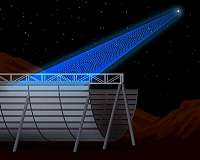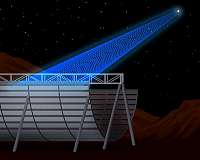McGill University scientists have developed a new system for sharing the enormous amount of data being generated by the CHIME radio telescope in its search for fast radio bursts (FRBs), the puzzling extragalactic phenomenon that is one of the hottest topics in modern-day astronomy.
It is not uncommon for the CHIME/FRB project to pinpoint several FRB events in a single day of operation as it sifts through nearly 1 million gigabytes of data gathered by the telescope. With the new data sharing system, which uses Virtual Observatory Event (VOEvent), a standardized language for reporting astronomical events, key details about each FRB that CHIME detects can now be sent in real time to observatories all over the world, allowing them to train their instruments on the source and gather further clues towards unravelling the mystery of FRBs.
“The enormous volume of data that CHIME/FRB generates and the large number of new FRBs that it detects each day is like a gold mine for a community that is eager to point every kind of telescope that exists at the next FRB,” says Andrew Zwaniga, lead developer of the CHIME/FRB VOEvent Service and a research assistant in the Department of Physics at McGill.
Accelerating the pace of research
Free to use for anyone who has access to the internet, the new system fulfils the CHIME/FRB project team’s goal of making every FRB detected by CHIME available for other telescopes to target with as little delay as possible. The development is a key step towards bringing the resources of the international research community to bear on the data the CHIME/FRB project is generating.
“Since CHIME/FRB began operating in 2018, it has been like drinking from a fire hose in terms of the amount of data coming through,” says Emily Petroff, a postdoctoral researcher in the Department of Physics at McGill who played a key role in refining the alert system ahead of its public release. “We simply cannot extract all the science from this; we need the world’s help.”
Tuning in to CHIME
The developers of the CHIME/FRB VOEvent Service say “anyone who has access to a telescope and can reliably point it at a Northern sky location” will be able to make use of the alerts to make follow-up observations of the FRBs detected by CHIME.
“We have prepared tutorials and substantial documentation for new and veteran users of VOEvents to get started quickly,” Zwaniga says. “We are inviting comments and questions regarding VOEvents from the community on our public-facing CHIME/FRB community GitHub page.


